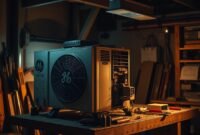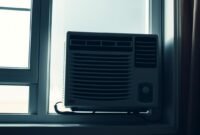Seeing water around your LG portable air conditioner can be upsetting. Water leaks are common and can quickly become a big problem. If your LG portable air conditioner is leaking water from the bottom, it’s not just messy. It could also mean there are serious issues that need to be fixed right away.
I’ve dealt with many lg air conditioner troubleshooting cases. Water leaks can come from easy fixes or more serious mechanical issues. Knowing what’s causing the leak is key to avoiding damage and keeping your air conditioner working well.
In this detailed guide, I’ll show you how to find the problem, fix it, and prevent future leaks. This will help your LG portable air conditioner run smoothly and without leaks.
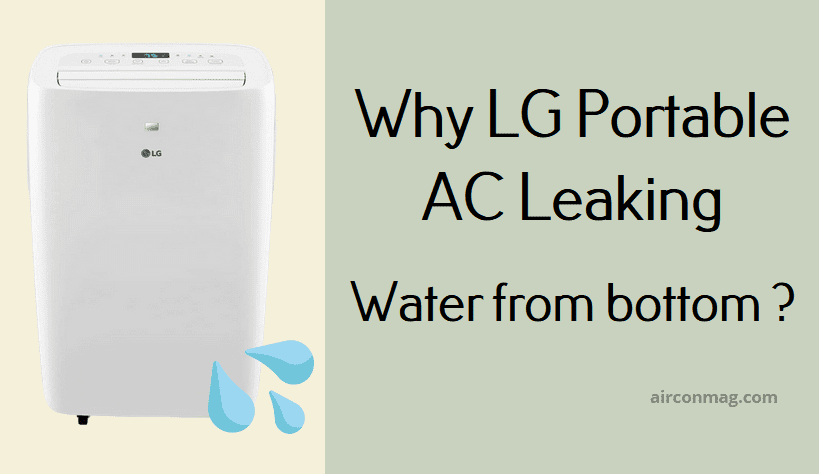
Understanding Why Portable Air Conditioners Produce Water
Portable air conditioners collect water as they cool the air. Let’s explore why this happens and how it works.
Portable AC units remove humidity to cool the air. Warm air meets cold coils, making moisture condense. This is a normal part of how they work.
The Basic Science of AC Condensation
Your portable AC is like a dehumidifier and cooler. Here’s what happens when it pulls in warm air:
- Warm air contacts cold coils
- Moisture transforms into liquid droplets
- Water collects in a built-in tank or drainage system
Normal Water Production vs Problematic Leakage
Not all water from your AC is a problem. Most units collect 1-3 pints of water daily. But, too much water outside the tank means you should check it.
How LG Units Handle Moisture
LG portable air conditioners have special moisture systems. They often have:
- Large water collection tanks
- Auto-evaporation technologies
- Multiple drainage options
Knowing how these systems work helps keep your AC running right and prevents water leaks.
Common Causes of LG Portable Air Conditioner Leaking Water From Bottom
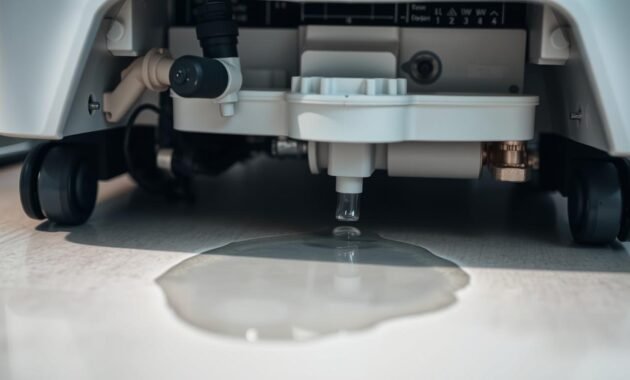
Dealing with a leaking LG portable air conditioner can be frustrating. Over the years, I’ve found several reasons why your unit might leak water from the bottom.
Water leaks in portable air conditioners often come from several issues. Knowing these causes helps you fix problems quickly before they get worse.
- Clogged Drain Lines: Accumulated debris can block proper water drainage
- Full Condensate Tank: Overflowing water collection reservoir
- Dirty Air Filters: Restricted airflow causing condensation buildup
- Improper Unit Positioning: Uneven surface preventing correct water flow
- Faulty Condensate Pump: Mechanical issues preventing water removal
High humidity can make these problems worse. When your air conditioner works harder to cool and dehumidify, more condensation forms. This can overwhelm the unit’s drainage system if not managed well.
I suggest regular maintenance checks to avoid these common water leakage issues. Cleaning filters, ensuring proper unit placement, and monitoring condensate tank levels can greatly reduce the risk of unexpected water leaks in your LG portable air conditioner.
Identifying the Source of Water Leakage
Dealing with a condensate leak in your portable air conditioner can be frustrating. I’ll help you find out where the water is coming from. We’ll figure out what’s causing your LG portable air conditioner drainage issue.
Water leakage in your LG portable air conditioner can happen in three main areas. Finding the exact source is key for fixing the problem and avoiding water damage.
Front Panel Leaks: What They Mean
Leaks from the front panel usually mean the drain system is blocked. When condensation can’t get out, water might leak through the front panel. Look out for these signs:
- Water droplets around the front panel edges
- Moisture buildup near the control area
- Dampness on the front grille
Bottom Leakage Warning Signs
Leaks from the bottom often mean the water tank is full and needs attention. In my experience with LG portable air conditioners, frequent bottom leaks can signal:
- Water tank is completely full
- Drainage system is clogged
- Improper unit leveling
Side Vent Dripping Concerns
Drips from side vents usually mean condensation overflow. This happens when your portable air conditioner can’t handle moisture levels. The leak might be more noticeable in humid places.
By checking these areas carefully, you can find and fix your LG portable air conditioner’s water leak. This way, you can avoid bigger problems.
Proper Maintenance to Prevent Water Leakage
Keeping your LG portable air conditioner in good shape is key to avoiding water leaks. Regular maintenance helps your unit work better and lasts longer. This can save you money and hassle in the long run.
Consistent care is the secret to avoiding problems with your LG cooling unit. Here are the main steps to follow:
- Clean the air filter monthly or every 45 days
- Inspect the condensate drain line for blockages
- Check the unit’s overall condition quarterly
- Perform a thorough cleaning at least once a year
When you clean your LG portable air conditioner, focus on these important areas:
- Remove and wash the air filter with mild detergent
- Clean the external and internal coils with care
- Clear the drain line with a mix of water and vinegar
- Use a soft, damp cloth to wipe the unit’s exterior
The drain system is very important. A clogged drain can cause water leaks and lower efficiency. Always check the drain line before the cooling season starts to avoid problems.
Don’t forget about where you place your unit. Make sure it’s on a level surface and has enough space around it for air to flow. This simple step can greatly reduce the chance of water buildup and leaks.
Checking and Cleaning the Drain System
Dealing with an lg portable air conditioner drainage issue can be frustrating. But, I’ll guide you through a detailed drain system maintenance process. Regular cleaning stops water leaks and keeps your LG portable air conditioner working well.
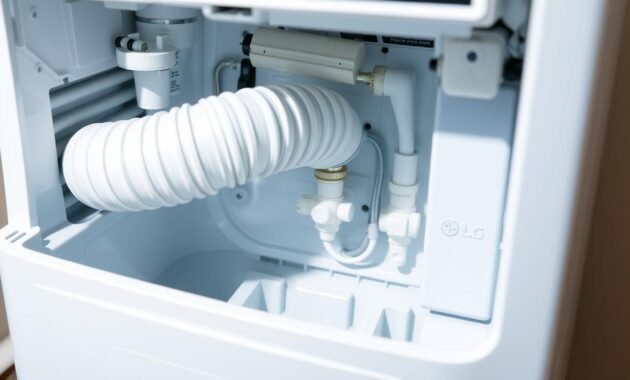
When your LG AC shows signs of water leakage, check the drain system first. A clogged or dirty drain line can turn a small problem into a big repair issue.
Drain Line Inspection Steps
- Unplug the air conditioner for safety
- Locate the drain line at the back or bottom of the unit
- Remove the drain pan carefully
- Check for visible debris or blockages
- Inspect the drain line for any signs of clogging
Clearing Blockages Safely
I suggest using a small brush or pipe cleaner to clear debris. For tough blockages, warm water and mild detergent can help dissolve grime.
Professional Cleaning Methods
While DIY maintenance works for many issues, some need a pro. If cleaning doesn’t solve the problem, call an LG-certified technician for repairs.
Preventative maintenance is vital to avoid expensive repairs. Regular drain system checks save time, money, and stress in the long run.
The Role of Air Filters in Preventing Leaks
Air filters are key in stopping portable ac water leaks. Many people don’t see how important clean filters are. But they are vital for your LG portable air conditioner’s health and avoiding water problems.
Read also: Air Conditioner Drain Line Outside House Leaking
Dirty air filters can really mess up your portable air conditioner. When they get clogged, they block airflow. This causes a few big problems:
- Less cooling power
- More condensation buildup
- Water leaks from the unit
- Poorer air quality
I suggest a regular maintenance plan for your LG portable AC. Here’s a simple guide to filter care:
| Filter Type | Cleaning Frequency | Cleaning Method |
|---|---|---|
| Washable Filters | Every 2 weeks | Lukewarm water, mild detergent |
| Replaceable Filters | Every 3-6 months | Complete replacement |
Keeping your filters clean is essential to avoid water leaks. Clean filters not only lower the chance of water issues. They also make your air conditioner work better and last longer.
When you clean your filters, make sure they’re dry before putting them back. Wet filters can grow mold and cause more problems with your LG portable air conditioner.
Read also: Can Humidifiers Cause Mold? Here’s Why
Humidity Control and Its Impact on Water Production
Keeping humidity levels in check is key to avoiding too much water in your LG portable air conditioner. High moisture can make a lot of water, leading to leaks and problems during troubleshooting.
How much water your air conditioner makes depends on indoor humidity. Different places need different ways to manage water collection.
Understanding Optimal Humidity Levels
The best humidity range is between 30% and 50%. If humidity goes over 60%, your LG air conditioner has to work harder. This can cause:
- More water collection
- Higher energy use
- System strain
Leveraging Dehumidifier Mode
Most LG portable air conditioners have a dehumidifier mode. This setting is better at controlling moisture than regular cooling. I suggest using it when:
- It’s raining
- It’s very humid in summer
- Rooms don’t get enough air
Seasonal Humidity Considerations
Seasons change humidity levels. Summer needs more moisture control than winter. Knowing this helps your LG air conditioner work better and avoid leaks.
Professional Repair vs DIY Solutions
When your LG portable air conditioner starts leaking, you have two choices. You can try to fix it yourself or call a professional for lg ac repair. Experts say most leaks can be fixed in under 10 minutes once you find the problem.
Start with some basic steps to fix the leak. Some repairs are easy and can save you money on professional help.
- Check the drainage tank and empty if full
- Inspect and clean air filters
- Verify drainage hose connections
- Clean condensate drain line
But, when should you call a pro? Some lg ac repair jobs need expert help:
- Refrigerant leaks
- Compressor malfunctions
- Electrical system issues
- Persistent water leakage after basic troubleshooting
To find a good HVAC technician, look online for reviews. Ask for certified LG service technicians and get quotes from several. A professional inspection might cost between $75-$200, depending on the repair.
While DIY fixes can handle small problems, big issues need a pro. They can prevent more damage to your air conditioner.
Conclusion
Dealing with an LG portable air conditioner leaking water can be frustrating. But, with the right knowledge, you can fix these problems. I’ve shown you how to diagnose, prevent, and solve water leakage issues.
Regular maintenance is key to keeping your LG cooling unit working well. You now know how to handle water leakage challenges. Remember, taking care of your AC prevents damage and makes it last longer.
If you’re stuck with water leakage problems, get professional help. While you can fix many issues yourself, some need an expert. Always choose the best for your AC’s health and performance.
My last tip is to stay alert and act fast when you see moisture. Keep up with regular maintenance. Your LG portable air conditioner will cool efficiently and with fewer surprises.

